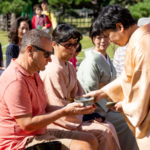How To Cope With The Shock Of Being An Outsider In Japan
Tips for Battling Foreigner Blues
No matter how long you live in Japan, the G-word can always bring you down. Or up.
“Gaijin da!” (It’s a foreigner!) It was far from the first time I had heard that phrase, but it had been a very long time since it was delivered in the style of “I’ve spotted a wild animal.” Yes, it caught me on a bad day and I found myself saying in Japanese – in as close as I could get to the same volume that my accuser had used – “rude child.” I now hang my head in shame because, yes, I was retaliating to a nine-year-old.
Although probably not intended to offend, her comment was discriminatory. At the very least, it defined me as separate from the Japanese people around me.
It appeared that my comment fell on deaf ears. I dearly hope that it did. Although probably not intended to offend, her comment was discriminatory. At the very least, it defined me as separate from the Japanese people around me. I’ve lived in this country for over 20 years and have been well liked and connected in my community. As a friend visiting from Australia remarked recently, “You’re embedded!” It’s pretty easy to see that if one looks at more than just the white of my skin. But many people don’t. So after a few tears and much introspection, I’ve come up with some thoughts to help you, and me, handle foreigner shock, because as long as we live here, we are set to have it thrust upon us again, and again, and again.

Put it in perspective
Some readers will no doubt say, “What’s your problem? You ARE foreign.” Yes, we get the point. But for many of us, that’s the reason we don’t need it pointed out. In my experience, the “gaijin da” comment is rarely intended to be derogatory, especially when it comes from a child. An observation made by the brain simply pops out of the mouth, bypassing any vetting along the way. That has always struck me as happening a lot in Japan, but that may be more due to the assumption that goes along with the comment – that the foreigner can’t understand the Japanese that is being said to it anyway. For a white foreigner here, the rest of the stereotype is that you speak English, are American and if you’re not a tourist, you must be an English-language teacher and you are probably rather raucous, too. That’s the problem, the pigeon-holing that comes along with the comment.
For a white foreigner here, the rest of the stereotype is that you speak English, are American and if you’re not a tourist, you must be an English-language teacher and you are probably rather raucous, too.
In fairness to my nine-year-old nemesis, though, that stereotype is something that I have pieced together. What motivated her comment I will never know, but it may have been that she studies English and was excited to discover a foreigner so conveniently nearby that she could perhaps practice with – since English is considered the international language. Or it may just have been an observation that popped out.

See the bright side
A wise person once told me that in order to overcome an upsetting experience, we need to find something good in it. If you’ve gotten a “gaijin da” and it’s gotten under your skin, you now know what it’s like to be the brunt of a discriminatory remark. It’s a considerably lightweight one. Compare it with the racial slurs that have characterized black versus white relations around the world. Now you know how important it is to raise your voice against such comments and make it clear to the speaker that you don’t agree with him/her.
Now you know how important it is to raise your voice against such comments and make it clear to the speaker that you don’t agree with him/her.
These days I usually get the “foreigner” word directed to me as a question from an under-ten-year-old and usually when I am with my constant companion, my kindergartener daughter, as I was this time, too. In such a situation I pleasantly respond that yes, I am a foreigner, but that she isn’t. My daughter’s looks veer to the Western side of half-Japanese. I make a point of distinguishing our nationalities because I want the kids to understand that one’s appearance isn’t always a good guide to our nationality or language or any other abilities. But this time the circumstances didn’t allow me to make such banter, and the remark stung all the more because I wasn’t able to create that upside to our interaction.

Bolster your immunity
Many years ago I picked up these fine words from a book or movie (that could have been Dead Poets Society): “some people criticize – that’s what they do.” Their comments actually have nothing to do with us. There are sad people in the world – and only some of them are literally so. Let them go on their way, without entangling you.
Grab a hanky
Some days we are more emotionally tender than normal. If the foreigner remark hits you on such a day, give yourself over to it. Feel the disappointment, feel the pain, have a good cry and then move on.
Last but not least, always remember that before accidentally becoming a foreigner, you were and still are much more than that — a brave woman for coming this far away from home, to name just one thing. That’s what is worth recognizing.
Have you ever experienced being called “gaijin”? What was your reaction and how do you cope with it? Share your experiences and advice in the comments!
















Leave a Reply